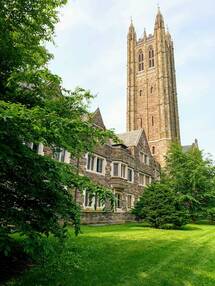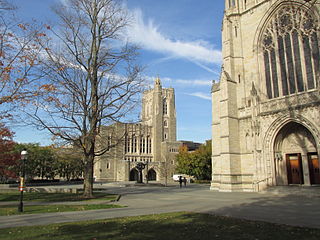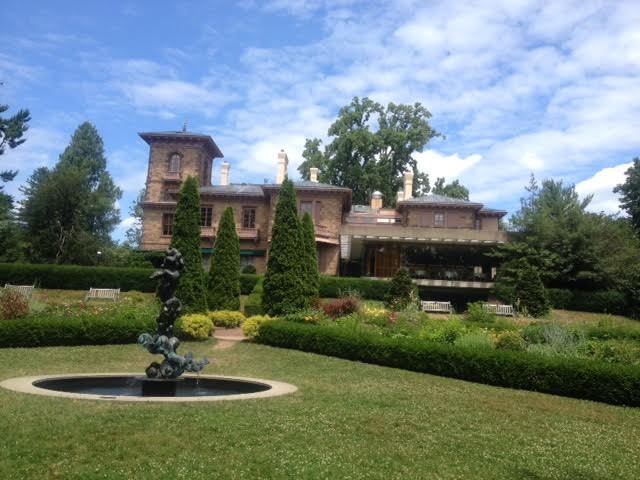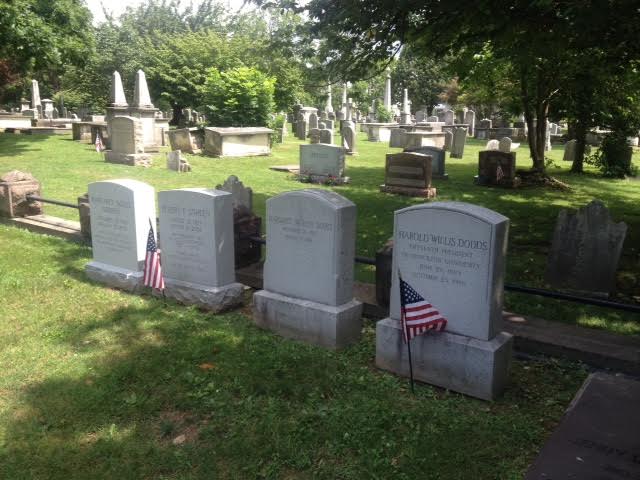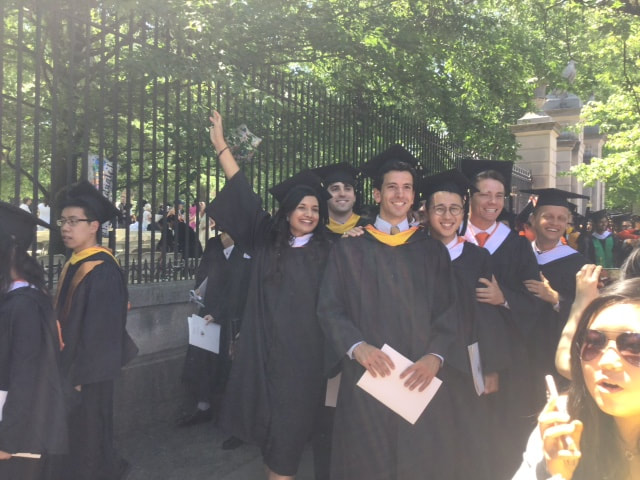-- New Jersey Universities & Colleges - Princeton University
- Public universities & colleges
* Rutgers * Montclair State * Rowan * Kean * NJ Institute of Technology * NJ City
* William Paterson * Stockton * College of NJ * Ramapo * Thomas Edison
- Private universities & colleges
* Princeton * Fairleigh Dickinson * Seton Hall * Drew * Bloomfield * Caldwell * Centenary
* Saint Elizabeth * Felician * Georgian Court * Monmouth * Rider * Saint Peters * Stevens
* Rutgers * Montclair State * Rowan * Kean * NJ Institute of Technology * NJ City
* William Paterson * Stockton * College of NJ * Ramapo * Thomas Edison
- Private universities & colleges
* Princeton * Fairleigh Dickinson * Seton Hall * Drew * Bloomfield * Caldwell * Centenary
* Saint Elizabeth * Felician * Georgian Court * Monmouth * Rider * Saint Peters * Stevens
|
"My experiences at Princeton have made me far more aware of my 'blackness' than ever before. I have found that at Princeton, no matter how liberal and open-minded some of my white professors and classmates try to be toward me, I sometimes feel like a visitor on campus; as if I really don't belong." Michelle Obama * Home
|
-- Princeton University
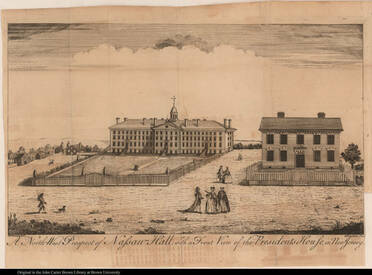
1764 copper engraving shows Nassau Hall (at left) and the President's House (right), first buildings on campus of College of New Jersey. When completed in 1756, Nassau Hall was the largest stone building in the colonies and in the Battle of Princeton on January 3, 1777, the British surrendered to General Washington here, with the building used to care for wounded soldiers. The New Jersey Assembly met at Nassau Hall in 1776, where it approved the State Constitution, and the Continental Congress met there from June to November in 1783, where it received General Washington and also was notified of the signing of the Treaty of Paris officially ending the war. The President's House (also known as Maclean House) was the residence of the president of the college, and currently hosts Princeton’s Office of Alumni Affairs. Image: Princeton University, see also current images at right
- Overview
One of world's leading universities. Chartered in 1746 as the College of New Jersey, re-named 1896 as Princeton University. Original site in Elizabethtown, relocated to Newark in 1747 and to Princeton in 1756. Announced return to on-campus classes in September 2021 after fully virtual classes in 2020-21 year due to COVID-19 Pandemic, requiring returning students to be vaccinated. Main campus set across from central business district of Town of Princeton, satellite campuses and properties in West Windsor, Plainsboro and South Brunswick, with some 180 buildings on 500 acres. Ranked #1 overall National University in 2022-23 US News & World Best Colleges. "From academic quality, to return on investment, to value, Princeton continues to be one of the best universities--if not the best---in the country." 2019 TheBestSchools.org. #2 (behind Stanford) in income after graduation compared to tuition and other costs in "Colleges that Pay You Back" 2019 Princeton Review. Ranked #7 in reputation among world universities in 2018 (behind Harvard, MIT, Stanford, Cambridge, Oxford, UC-Berkeley in 2018 TimesHigherEducation. Maintains focus on undergraduate education without professional graduate schools in law, medicine or business, ranks third among Ivy League schools (behind Brown and Dartmouth) in proportion of undergraduates in total enrollment. Announced June 2020 vote by Board of Trustees to remove name of Woodrow Wilson from campus facilities with former Woodrow Wilson School of Public and International Affairs renamed the Princeton School of Public and International Affairs, and residential Woodrow Wilson College renamed First College. Board stated decision based on Wilson's "racist thinking" and actions as US president to restore racial segregation of federal workforce. Announced September 2022 expansion of financial aid program so that most families whose annual income is less than $100,000 will pay nothing for tuition, room and board, up from the previous $65,000 annual income level. Some 1,500 Princeton undergraduates expected to receive this level of aid—more than 25% of the undergraduate student body.. The prior $3,500 student contribution typically earned through summer savings and campus work also will be eliminated. June 2023 US Supreme Court decision holding that Harvard admissions practice unconstitutional in giving preference to applicant children of alumni to impact Princeton, which has legacy acceptance rate over 30%, compared to 3.98% overall admissions rate for Class of 2025. - Campus
"Princeton is in the flat midlands of New Jersey, rising, a green Phoenix, out of the ugliest country in the world.... Two tall spires and then suddenly all around you spreads out the loveliest riot of Gothic architecture in America, battlement linked on to battlement, hall to hall, arch-broken, vine-covered-luxuriant and lovely over two square miles of green grass. Here is no monotony, no feeling that it was all built yesterday at the whim of last week’s millionaire; Nassau Hall was already thirty years old when Hessian bullets pierced its sides." F. Scott Fitzgerald Main campus of predominantly Georgian architecture with roots in design of Cambridge and Oxford, one of most traditional in US, setting for scenes in such movies as 'Admission" (2013, "A Beautiful Mind" (2001) and "IQ" (1994). Nearly all undergraduates reside on campus, with freshman and sophomores primarily residing at six residential colleges. In addition to housing, the residential colleges provide a variety of dining arrangements, educational and social activities and daily social life. Main campus buildings include Nassau Hall; University Chapel; Firestone Library; Mathey College; Princeton School of Public and International Affairs; Maclean House; Prospect House; Lewis Center for the Arts; and University Art Museum. Privately-owned eating clubs situated on Prospect Street, University also owns Garden Theater two-screen movie theater across Nassau Street from campus and leased to private manager. Forrestal Campus located three miles from main campus along US Route 1 in Plainsboro and South Brunswick, includes scientific research and Princeton Plasma Physics Laboratory site of federally-supported research on advanced nuclear fusion devices, as well as property developed for hotel, retail, housing. Campuses situated about one hour from both New York City and Philadelphia, accessible from Route 1, Route 206; and Route 33. Amtrak and NJ Transit rail station at Princeton Junction connected to campus by bus and taxi and 'Dinky' shuttle train. Frequent bus service to NY City with stop on Nassau Street near main gate of university. - Academics
Princeton undergraduates may pursue either the bachelor of arts (A.B.) or bachelor of science in engineering (B.S.E.) degrees. In addition to their departmental concentration, students may also earn certificates in nearly 60 specialized subjects.The past focus on traditional liberal arts and humanities program has been shifting as greater numbers of undergraduates select engineering, information technology and related fields as undergraduate majors. Most popular majors include: Computer Engineering; Economics; Public Policy/Political Science & Government; and History. Princeton's emphasis on promoting faculty-student interaction is illustrated by its system of offering 70 freshman seminars--limited to 15 students and often led by distinguished professors--and the precept system--lecture courses including a small discussion group that meets weekly to further explore lecture topics. During their junior and senior years, all students conduct independent research overseen by a faculty mentor in their home department, typically producing a senior thesis or other work product. * Undergraduate admission, Princeton University * Academics, Princeton University * US Department of Education, College Scorecard
* National Center for Education Statistics, College Navigator * Princeton Review - Cost and financial aid
Tuition and other costs are formally set each year by the Trustees of the University in mid-April. Despite its high costs, Princeton offers extensive financial aid programs. Since 2001, grants have replaced student loans in the Princeton financial aid package for all aid recipients. No Princeton student is required to borrow to meet their determined financial need, with some 60% of undergraduates receiving financial aid. Students from low-income families receive an average of some $60,00 in aid during their first year; and over 80% of recent seniors graduated without any debt. Announced September 2022 expansion of financial aid program so that most families with annual incomes less than $100,000 will pay nothing for tuition, room and board, up from the previous $65,000 annual income level. Some 1,500 Princeton undergraduates expected to receive this level of aid—more than 25% of the undergraduate student body.. The prior $3,500 student contribution typically earned through summer savings and campus work also will be eliminated. * Cost and financial aid, Princeton University * Princeton will enhance its groundbreaking financial aid program, 9/8/2022, Princeton University - Student body
Class of 2025 Overview:
New Jersey ranks highest of states in number of students with 216, ahead of California (142); New York (126); Pennsylvania (77); Massachusetts (69). Students from more than 50 foreign countries led by Canada, United Kingdom, India, South Korea, Australia, China. Nearly all undergraduates are in residence on the campus, and housing is guaranteed for all four years. In their first two years, most students reside at one of six residential colleges, a system established in 1982 which supports undergraduate housing and dining arrangements, extracurricular activities and social life. Juniors and seniors who wish to continue living in a residential college may do so, or they may live in junior and senior dormitories or privately-owned housing. Some 70% of juniors and seniors take their meals at one of 11 private, co-ed eating clubs; once criticized since their establishment in the 19th century for their exclusivity, as a result of both legal actions and voluntary reform the clubs now are open to most students seeking membership. Of the 11 eating clubs, five are “sign-in” clubs with members admitted on a first-come, first served system; the other six clubs are selective, with new members chosen through the "Bicker" process. Juniors and seniors who are not club members may dine in the residential colleges, cook their own meals in dormitory kitchens, join a cooperative; eat at local restaurants; or make other eating arrangements. * Admission statistics, Princeton University 
"I cannot bear to think that our young men are merely living four years in a country club and spending their lives wholly in a spirit of calculation and snobbishness".
John Grier Hibben, President of Princeton University, upon publication in 1920 of This Side of Paradise by F. Scott Fitzgerald, member of the Class of 1917 - Faculty
Approximately 950 full-time faculty members, with another 400 in part-time positions. According to Glassdoor.com, the typical salary of a full professor is $234,434, with a range from $142,943 to $281,650. Faculty salaries may also be supplemented through income from consulting; grant awards; royalties from books and inventions; and paid lectures and appearances. Faculty includes recipients of Nobel Prize in physics, literature, economic sciences, and medicine. over 30 past and present faculty and staff Nobel laureates, with an additional 40 Princeton alumni or researchers also laureates, with most recent Nobel awards former Professor Ben Bernanke (Economics 2022); Professor David MacMillan (Chemistry 2021); Professor Duncan Haldane (Physics co-recipient 2016). Other selected faculty with recent awards in diverse fields include Tracy K. Smith, (Pulitzer Prize poetry 2012, also current Poet Laureate of US); Matthew Desmond (Pulitzer Prize nonfiction 2016, MacArthur "genius" award); Jhumpa Lahiri (Pulitzer Prize fiction 2000); John McPhee (Pulitzer Prize nonfiction 1999); Jeffrey Eugenides, (Pulitzer Prize fiction 2003); Paul Muldoon (Pulitzer Prize poetry 2003); Joyce Carol Oates (National Humanities Medal fiction 2010); Manjul Bhargava (Fields Medal in Mathematics 2014); - Alumni Prominent alumni include US Presidents James Madison and Woodrow Wilson; Vice Presidents Aaron Burr, Jr., John Breckenridge and George Dallas; former First Lady Michelle Obama; US Supreme Court Justices Elena Kagan, Sonia Sotomayor and Samuel Alito; Amazon founder and CEO Jeff Bezos; actress Brooke Shields; Secretary of State and White House chief of staff James Baker; Secretary of Defense and White House chief of staff Donald Rumsfeld; US Senator and basketball star Bill Bradley; Federal Reserve chairman Paul Volcker; Hewlett-Packard and eBay CEO Meg Whitman; actor Jimmy Stewart; authors F. Scott Fitzgerald, Booth Tarkington, John McPhee and Joyce Carol Oates; author and New Yorker editor-in-chief David Remnick; columnist and political analyst George Will; producer and writer David E. Kelley; investor Carl Icahn; General and CIA Director David Petraeus; playwrights Eugene O'Neill and Thornton Wilder; mathematician John Forbes Nash; NJ Governors Thomas Kean and Brendan Byrne, - Controversies
Recent controversies have included re-assessment of the past role of the University and its leaders in racial discrimination. In 2016, despite student protests and sit-in calling for removal of Woodrow Wilson's name from Woodrow Wilson School of Public and International Affairs and Woodrow Wilson Residential College rejected by University trustees, but agreed to educational program to highlight past discrimination, re-named auditorium in Wilson Hall after prominent black alumnus, also identified alumni and campus sites highlighting contributions of minorities. In June 2020, however, Board of Trustees voted to remove Wilson name in midst of national reassessment of impact of racism in society, with Woodrow Wilson School of Public and International Affairs renamed the Princeton School of Public and International Affairs, and residential Woodrow Wilson College renamed First College. Board stated decision based on Wilson's "racist thinking" and actions at University and as US president. A current lawsuit against Harvard University also renews past questions over the selective admissions policies at Harvard, Princeton and other elite universities. In 2006 and 2011, two students claimed Princeton discriminated against Asian and Asian American students, but the U.S. Justice Department's Office of Civil Rights concluded after a nine-year investigation that there was insufficient evidence to support the allegations. The ongoing litigation challenging Harvard's policies, which is currently on appeal after a lower court judge ruled in Harvard's favor, again raises issues over the admissions process, with the Asian-American applicants contending that they suffered discrimination when Harvard gives preference to racial minorities who lack comparable academic qualifications. The University also has been the target of criticism over its relations to the municipalities in which it owns facilities. A lawsuit brought in behalf of several resident taxpayers contesting the school's claim of tax-exempt status was settled by the University in 2016 for a payment of $18.2 million over six years. Another conflict arose over the University's construction of its $300 million, 22-acre complex opened in 2017 for the Lewis Center for the Arts, which included relocation of the 'Dinky' train station and shuttle to the Amtrak-NJ Transit main line some 460 feet further from the business district, a plan which the University successfully implemented despite substantial legal challenges and criticism from members of the community. * Princeton University Common Data Set 2021-22 * President Eisgruber’s message to community on removal of Woodrow Wilson name from public policy school and Wilson College, Princeton University, 6/27/2020 * Admissions Lawsuit: Harvard's Ahead, but It's Not Over, Forbes. com, 10/2/2019 * University to Pay $18.2 million to Settle Tax Suit, 11/9/2016, Princeton Alumni Weekly * Lewis Center for the Arts, Princeton Magazine - History
* Slaves in the Ivy League: Princeton Discovers Its Racial Past, 11/6/2017, Chronicle of Higher Education
* Princeton's Complicated Legacy: Reconsidering Woodrow Wilson and a Slave Named Jimmy Johnson, 8/9/2018, Philly.com * Princeton--Yes Princeton--Takes On the Class Divide, 5/30/2017, NY Times * Students Walk Out After Princeton Professor Used Racial Slur in Class On Hate Speech, 2/19/2018, HuffPost.com * Princeton Slavery Project |
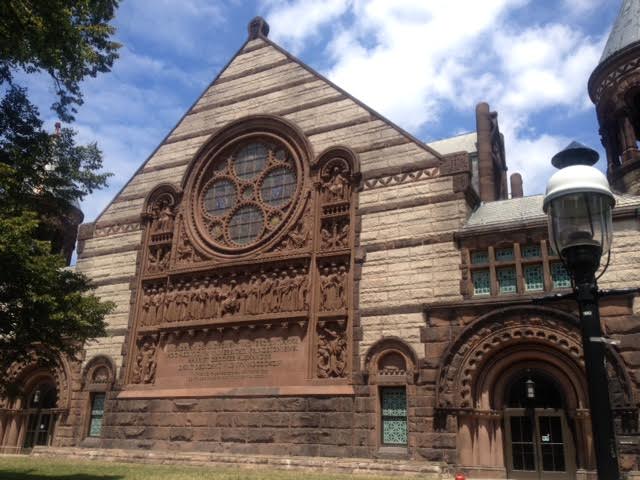
Alexander Hall, which contains 900-seat Richardson Auditorium, wis named in honor of three generations of the Alexander family, who all served as University trustees. Completed in 1894, it previously was the site of annual Commencement ceremonies and other major events, lectures and performances. Image: NewJerseyAlmanac.com
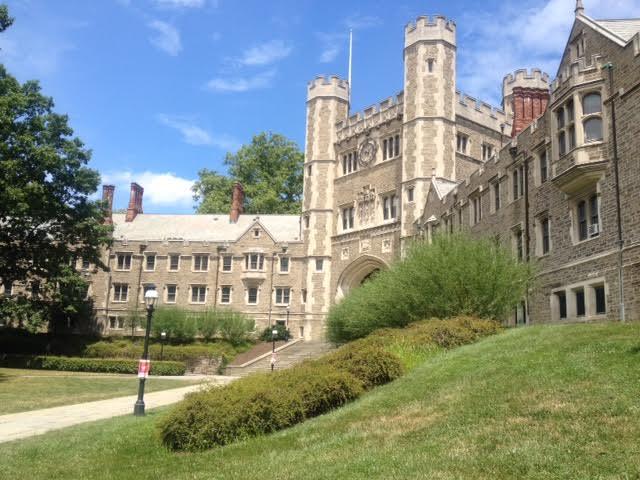
Mathey College, named after alumnus in Class of 1912 and long-time University trustee and patron Dean Mathey, was established in 1982 and is one of six residential colleges at Princeton. It is known for Blair Arch, the largest arch on campus featured prominently in the movie A Beautiful Mind. Image: NewJerseyAlmanac.com
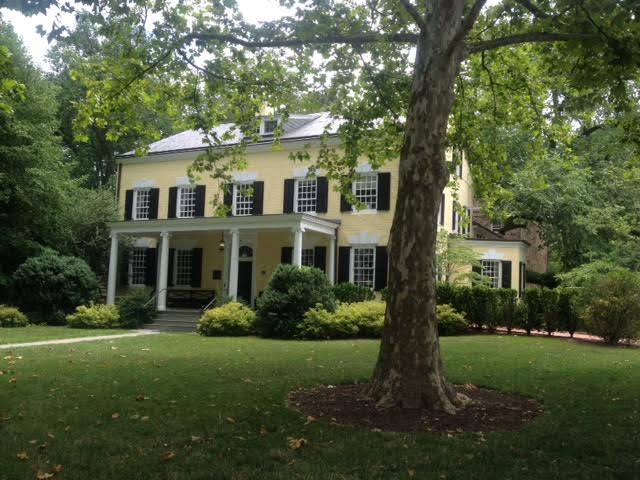
Maclean House, also known as the President's House, was built in 1756 to serve as the home of the President of the College of New Jersey. John Witherspoon, the College president, lived here from 1768 through 1779, during which time he served as a delegate to the Continental Congress and signed the Declaration of Independence. George Washington occupied Maclean House in January 1777, during the Battle of Princeton and in 1783 while Congress met nearby in Nassau Hall. Image: NewJerseyAlmanac.com
|
